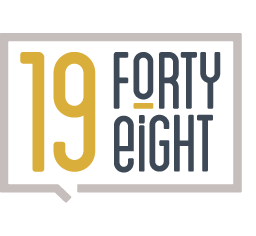Most people wouldn’t dream of delivering a speech, a pitch or a wedding toast without at least a little rehearsal. So why do we think we can walk into a difficult conversation – where emotions run high, stakes are raised and clarity is key – without the same level of preparation?
At 1948, we work with businesses, leaders and teams to transform how they communicate. And time and again, we return to one simple truth from the actor’s toolkit: rehearsal matters. Not just for the stage – but for the boardroom, the performance review or the conflict resolution conversation that’s been giving you heart palpitations and sleepless nights for a week.
Acting is communication under pressure
Actors rehearse for weeks to deliver a single line with the right intention, energy and timing. They don’t wing it. Because when the spotlight’s on, there’s no room for guesswork.
The same is true for challenging conversations. What you say – and how you say it – matters. So why not give yourself the same advantage actors do?
Rehearsing isn’t about scripting. It’s about preparing your intention
A common myth is that rehearsal means memorising lines. But in the actor’s world, rehearsal is about finding clarity of objective. What do I want from this scene? What does the other person want? Where are the moments of tension or vulnerability? What knowledge am I bringing into the scene?
You can do the same before a conversation:
- What’s the outcome I’m hoping for?
- How do I want the other person to feel?
- What do I need to say, clearly and calmly, even if it’s uncomfortable?
- What’s the history of the relationship?
Rehearsing aloud (yes, out loud!) helps you hear the tone and cadence of your words. You’ll notice where your voice falters, where you soften too much or where you sound harsher than intended. That’s gold. It gives you a chance to adjust before emotions take over.
Try this: a simple actor’s warm-up for real-life conversations
At 1948, we often take clients through a short mental “scene breakdown” before a difficult conversation at work:
- Set your objective – What’s your intention? Be specific. “I want them to understand why this deadline matters.” Not “I want to get this over with.”
- Visualise the setting – Where will this happen? On a Zoom call, in a café, walking side by side? Environment affects energy.
- Anticipate the beats – Where might the tone shift? Is there a point where they may push back, or get emotional? What will you do in that moment?
- Practice the opening – Just the first 30 seconds. Get it in your body. Say it aloud. Notice what feels awkward or forced. Tweak until it feels true. What is the opening question?
Rehearsal builds confidence – and compassion
Rehearsing doesn’t mean you’ll control every outcome. You won’t. People are human. They’ll surprise you. But what rehearsal does give you is this:
→ More self-awareness
→ Less reactivity
→ Greater choice in the moment
When you’re calm, centred and clear on what you want to say, it creates space for the other person to do the same. That’s the real power of rehearsed conversations. They’re not robotic. They’re deeply human.
Start small, then go deep
You don’t need to rehearse every chat with your boss. But for the conversations that keep you up at night – where your stomach flips just thinking about them – give rehearsal a go.
Practice with a friend. Speak to your phone camera. Say it to the mirror. Yes, you’ll feel a bit ridiculous, but no, that’s not a reason not to try.
Because here’s the truth: navigating difficult conversations gets easier when you treat them like a performance worth preparing for.
At 1948, we help people do just that. With the tools of the actor, the clarity of the communicator and a deep belief in the power of rehearsal to shift everything.
Want help preparing for your next big conversation?
Whether it’s a career-defining pitch, a challenging 1:1 or a moment where everything’s on the line—we’d love to support you.
Get in touch with us here and let’s rehearse it together.


